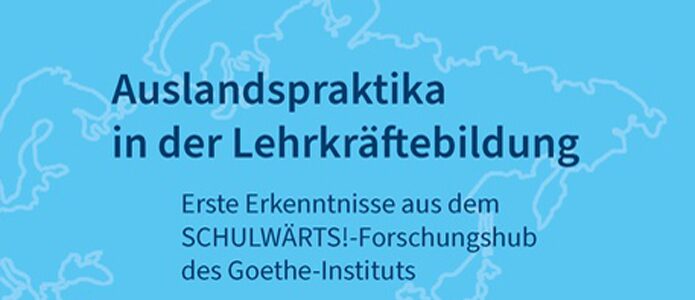Internationalisation in teaching
Some initial findings from the SCHULWÄRTS! research hub

© Fotolia, Rido
A look at German university curricula shows that teacher training has yet to be internationalised all over the country. In a recently published anthology of articles on the subject, the SCHULWÄRTS! research hub explains why it’s so important for teacher trainees to do placements abroad.
By Seyna Dirani
Why do a placement abroad?
There are many different ways to internationalise teacher training. One way is through placements abroad. Over the past decade, more and more teachers and researchers have been calling for a more international approach to teacher training. As a great many studies show, learning to deal competently, comfortably and confidently with linguistic and cultural diversity is an indispensable component of teacher training, a skill that needs to be learned.What are the concrete benefits of international mobility for student teachers? To what extent is such mobility possible, how and where? What does and should it have to offer? To what extent does it actually meet the trainees’ expectations? And what purposes are served by programmes like SCHULWÄRTS!? The Goethe-Institut’s SCHULWÄRTS! research hub addresses these questions in a recently published anthology of research articles entitled Auslandspraktika im Lehramtsstudium. Erste Erkenntnisse aus dem SCHULWÄRTS!-Forschungshub des Goethe-Instituts (“Student Teacher Placement Abroad: Initial Findings from the Goethe-Institut’s SCHULWÄRTS! Research Hub”).
The SCHULWÄRTS! programme at a glance
SCHULWÄRTS! arranges and funds two- to four-month placements in Goethe-Institut partner schools in currently more than forty different countries, providing a flexible opportunity for teacher trainees in Germany to gain some practical experience abroad. A multi-level support structure and the dovetailing of theory and practice in pre- and post-placement seminars are designed to help the interns gain lifelong skills, including intercultural competence. The two main goals of the programme are to further the internationalisation of teacher training in Germany and to nurture a lasting relationship between the schools and the Goethe-Institut. So the SCHULWÄRTS! programme plays an essential role in the Goethe-Institut’s language and training policy.What’s special about SCHULWÄRTS! is the bidirectional exchange: working together and getting to know different learning cultures forges a tie between the participating countries. The point is to break down the distinction between “internal” and “external”, between domestic and international, and ultimately to strive to create an internationally oriented educational landscape.
Creation of the research hub
More research on the internationalisation of teacher training is a must: a comprehensive study on teacher training placements abroad, including expertises from various angles, will also be a contribution to research on internationalisation efforts in general.This is why the SCHULWÄRTS! research hub was created in the autumn of 2019. It’s an interdisciplinary framework for both theoretical and empirical research on the subject. The object is to open up German universities and schools by making contributions to research and discourse about internationally oriented teacher training. The hub serves as a working and discussion platform that connects up researchers in various disciplines, as well as a useful research tool for individual projects. The SCHULWÄRTS! programme provides an inside look at public education systems in over forty different countries. What’s more, the now large SCHULWÄRTS! community provides a huge and diverse pool of potential participants for research studies in the field. So SCHULWÄRTS! is a useful resource for theoretical studies as well as for obtaining new empirical data for quantitative and qualitative research projects.
Assorted expertise brought together in an anthology
The wide range of research produced within the hub covers various aspects and dimensions of internationalisation with reference to the SCHULWÄRTS! programme. After only two years in existence, the SCHULWÄRTS! research hub has already produced an impressive anthology of research articles.
| Goethe-Institut
Studies in the fields of cultural theory, educational science, teaching methodology and practice, international teacher training, and educational research and policy are providing useful insights into and initial findings on the significance and effectiveness of mobility programmes like SCHULWÄRTS! for educational systems in Germany and abroad. The anthology can be downloaded free of charge from the SCHULWÄRTS! website.
After only two years in existence, the SCHULWÄRTS! research hub has already produced an impressive anthology of research articles.
| Goethe-Institut
Studies in the fields of cultural theory, educational science, teaching methodology and practice, international teacher training, and educational research and policy are providing useful insights into and initial findings on the significance and effectiveness of mobility programmes like SCHULWÄRTS! for educational systems in Germany and abroad. The anthology can be downloaded free of charge from the SCHULWÄRTS! website.Concrete example of intercultural competence
Although living and learning or working abroad presumably promotes intercultural competence (European Commission 2014), we need a more precise definition of this “key outcome”: What does the term “intercultural competence” encompass and which specific skills are necessary for teacher training?Various studies have shown that living and learning abroad is conducive to the development of so-called “soft skills”. Various studies have shown that living and learning abroad is conducive to the development of so-called “soft skills”. But soft skills are only one side of intercultural competence and are rather located in the business sector. So they’re not specifically tailored to the teaching profession.
In her contribution to the anthology, Julia Schmengler presents the theoretical derivation of a cultural competence model for teachers which she developed for her doctoral thesis on teacher trainee experiences abroad, in which she also discusses previous models. Her cultural competence model specifically includes knowledge, skills and abilities, aspects that relate to general conditions and methods of teaching and learning at school and appear to be important in dealing professionally with intercultural teaching situations.
The interdisciplinary articles in the anthology serve not only to promote internationalisation research, but also to provide explicit recommendations for the design of internationally oriented teacher training.
Literature:
Goethe-Institut (ed.) (2022): Auslandspraktika im Lehramtsstudium. Erste Erkenntnisse aus dem SCHULWÄRTS!-Forschungshub des Goethe-Instituts. Münster: Waxmann Verlag.
Available online:
Anthology of research articles: Auslandspraktika im Lehramtsstudium. Erste Erkenntnisse aus dem SCHULWÄRTS!-Forschungshub des Goethe-Instituts.